Are you curious about the carb content in your favorite corn chips? You’re not alone! Corn chips are a popular snack enjoyed by many, but understanding their nutritional composition is essential for making informed choices about what we eat. In this article, we will delve into the truth about the carbohydrate content of corn chips, uncovering the facts and providing valuable insights into their nutritional value.
- Corn chips can be enjoyed in moderation as part of a balanced diet.
- Understanding the nutritional facts of corn chips is important for making informed choices.
- Tortilla chips, made from corn, are a source of carbohydrates, fiber, essential minerals, and healthy fats.
- Portion control and moderation are key when consuming corn chips.
- Low carb options are available for individuals looking to reduce their carbohydrate intake.
Understanding Corn Chips Nutrition Facts
Delve into the nutrition facts of corn chips and discover how they impact your diet. When it comes to corn chips, it’s important to be aware of the nutritional information. Let’s take a closer look at the breakdown of these crunchy snacks:
| Nutrient | Amount Per Serving |
|---|---|
| Total Carbohydrates | 27g |
| Net Carbohydrates | 22g |
| Fiber | 5g |
| Serving Size | 1 ounce (28g) |
Corn chips typically contain 27 grams of total carbohydrates per serving, with 22 grams of net carbohydrates. Net carbohydrates refer to the total carbs minus the fiber content, which in this case is 5 grams. Fiber is an essential component of a healthy diet as it aids in digestion and helps you feel fuller for longer.
According to a recent study published in the Journal of Nutrition, consuming a diet rich in dietary fiber can help lower the risk of chronic diseases such as heart disease and type 2 diabetes.
In addition to carbohydrates and fiber, corn chips also provide essential minerals and healthy fats. These snacks contain minerals such as calcium, iron, and potassium, which are important for maintaining overall health. While corn chips may not be considered a significant source of these minerals, they can still contribute to your daily nutrient intake.
So, next time you reach for a bag of corn chips, be mindful of the portion size and enjoy them in moderation as part of a balanced diet. Pair them with healthier options such as fresh salsa or guacamole to add more nutritional value to your snack. Remember, it’s all about finding the right balance and making informed choices to support your overall well-being.
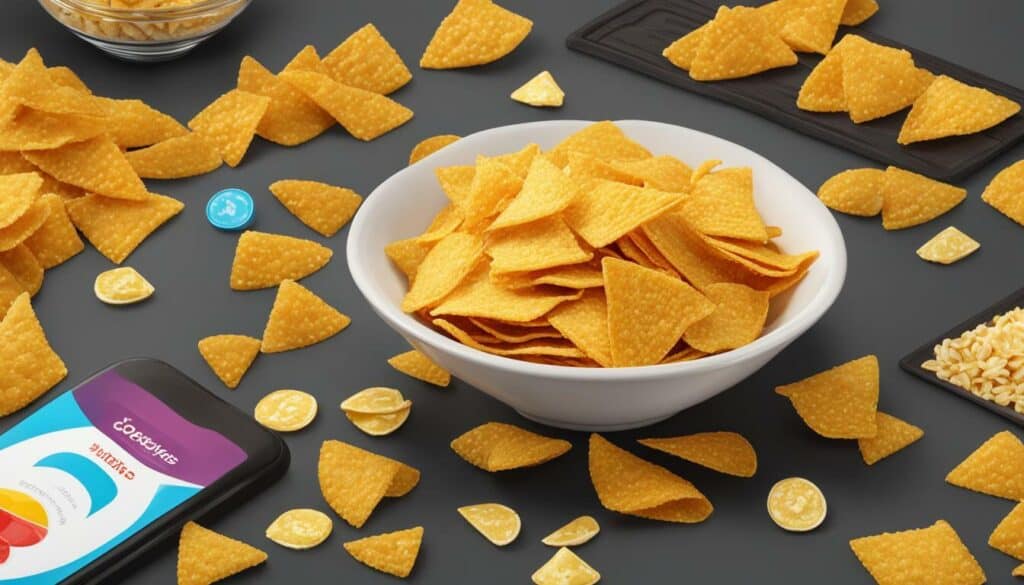
Let’s take a closer look at the calorie count of corn chips and the role it plays in your overall diet. When it comes to snacking, it’s essential to be aware of the nutritional content of the foods we enjoy. Corn chips, a popular snack option, can vary in their calorie content depending on the brand and serving size.
According to a nutrition facts analysis, a typical serving size of corn chips, which is about 1 ounce or around 28 grams, contains approximately 140 to 150 calories. These calories primarily come from the combination of carbohydrates and fats present in the chips. It’s important to note that the calorie count can slightly vary, so always check the packaging for the most accurate information.
The calorie content of corn chips can be influenced by factors such as the cooking method, additional flavorings, and the type of oil used in the manufacturing process. Some brands may use healthier alternatives like sunflower oil or avocado oil, which can impact the calorie count and overall nutritional profile of the chips.
While corn chips can be a satisfying snack, it’s essential to practice portion control to manage your calorie intake. Consider pairing them with a nutritious dip or salsa, which can add flavor while keeping the overall calorie count in check. Remember, balance is key when it comes to enjoying corn chips as part of a balanced diet.

| Brand | Serving Size (1 ounce) | Calories |
|---|---|---|
| Brand A | 28g | 140 |
| Brand B | 28g | 150 |
| Brand C | 28g | 155 |
The Fiber-Rich Nature of Corn Chips
Did you know that corn chips can be a good source of dietary fiber? While often considered a guilty pleasure, these crunchy snacks can actually provide a surprising nutritional benefit. Fiber plays a crucial role in our overall health, aiding in digestion, weight management, and even reducing the risk of certain diseases.
Fiber is a type of carbohydrate that the body cannot fully digest. Instead, it passes through the digestive system, adding bulk to our stools and promoting regular bowel movements. This helps to prevent constipation and keep our digestive system functioning smoothly.
Not only can corn chips be a tasty snack option, but the fiber content in these chips can also contribute to a feeling of fullness, helping to curb hunger and promote healthy portion control. Additionally, fiber can slow down the absorption of sugar into the bloodstream, which can help stabilize blood sugar levels and provide a steady supply of energy.
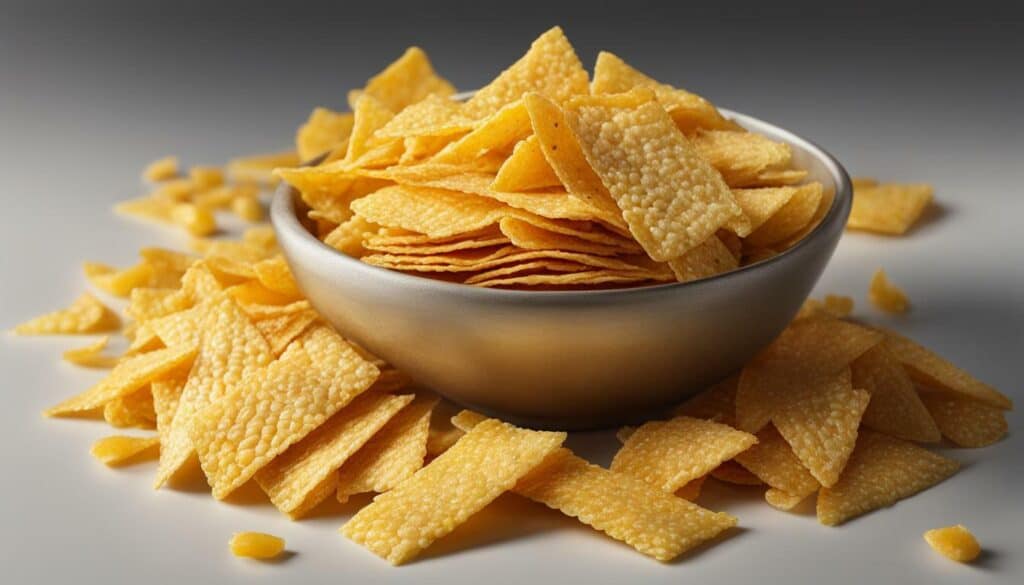
To put it into context, let’s take a look at the nutritional facts of corn chips. According to the provided image, a serving size of 1 ounce (approximately 28 grams) contains 1 gram of fiber. While this may not seem like much, it can add up if you enjoy a few handfuls of chips. Incorporating corn chips into a well-balanced diet along with other fiber-rich foods, such as fruits, vegetables, and whole grains, can help you meet your daily fiber needs.
| Nutritional Information | Amount per Serving (1 oz) |
|---|---|
| Calories | 150 |
| Total Carbohydrates | 18 grams |
| Fiber | 1 gram |
| Sodium | 125 milligrams |
| Protein | 2 grams |
As always, it’s important to enjoy corn chips in moderation as part of a well-rounded diet. Pair them with healthier options, such as salsa, guacamole, or Greek yogurt-based dips, for added nutrients and flavor. By being mindful of portion sizes and balancing your intake, corn chips can be a satisfying snack that contributes to your overall dietary goals.
Essential Minerals and Healthy Fats in Corn Chips
Besides carbohydrates, corn chips also offer essential minerals and healthy fats that can contribute to a balanced diet. These nutrients play a vital role in supporting overall health and well-being. Let’s take a closer look at the nutritional value of corn chips.
Corn chips contain essential minerals such as iron, potassium, and magnesium. Iron is essential for carrying oxygen throughout the body, while potassium helps maintain proper heart function and blood pressure. Magnesium is important for bone health and various enzymatic reactions in the body. Including corn chips in your diet can provide a convenient source of these essential minerals.
| Minerals | Amount per Serving |
|---|---|
| Iron | 2% of the Daily Value (DV) |
| Potassium | 2% DV |
| Magnesium | 2% DV |
In addition to minerals, corn chips also contain healthy fats. These fats are predominantly monounsaturated and polyunsaturated fats, known to support heart health. They can help lower LDL (bad) cholesterol levels and reduce the risk of heart disease when consumed as part of a balanced diet.
Remember, while corn chips can provide essential minerals and healthy fats, it is important to consume them in moderation. Pairing them with nutrient-rich foods, such as salsa or guacamole, can enhance their nutritional value. So go ahead and enjoy your corn chips guilt-free, knowing that they can be part of a well-rounded and balanced diet.
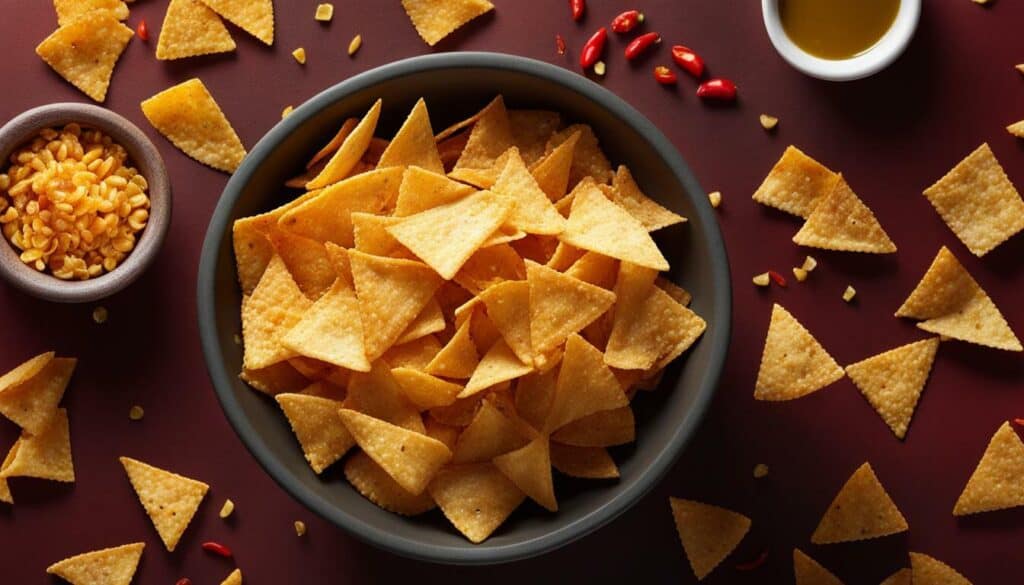
Sources:
1. Nutrition Facts and Analysis of Corn Chips (per 1-ounce serving).
2. Nutrition Facts of Tortilla Chips.
3. Essential Minerals for a Healthy Body.
Are There Low Carb Corn Chips?
If you’re watching your carb intake, you might wonder if there are low carb alternatives when it comes to corn chips. The good news is that there are options available that can satisfy your craving for this popular snack while keeping your carbohydrate consumption in check.
One option to consider is choosing corn chips that are made with alternative ingredients, such as almond or coconut flour. These variations often have lower carb counts compared to traditional corn chips. They also offer a different flavor profile, adding a unique twist to your snacking experience.
Another way to enjoy low carb corn chips is by opting for baked or air-popped varieties. These chips are typically made with less oil, resulting in a lower overall calorie and carbohydrate content. Plus, they can still provide the satisfying crunch you crave without the extra carbs.
How to Choose Low Carb Corn Chips?
When selecting low carb corn chips, it’s essential to review the nutrition facts label. Look for options that have a lower total carbohydrate count per serving. Also, pay attention to the fiber content, as fiber can help offset the impact of carbs on your blood sugar levels.
To make it easier for you, here’s a comparison of the nutritional content of regular corn chips and some common low carb alternatives:
| Product | Total Carbohydrates (per serving) | Dietary Fiber (per serving) |
|---|---|---|
| Regular Corn Chips | 20g | 2g |
| Almond Flour Corn Chips | 10g | 6g |
| Coconut Flour Corn Chips | 8g | 5g |
| Baked Corn Chips | 15g | 3g |
| Air-popped Corn Chips | 12g | 4g |
Remember, while low carb corn chips can be a suitable option for those following a reduced carbohydrate diet, it’s still essential to practice portion control and enjoy them as part of a well-balanced eating plan.
Corn Chips and the Glycemic Index
Are you concerned about the impact of corn chips on your blood sugar levels? Let’s talk about the glycemic index. The glycemic index (GI) is a scale that measures how quickly carbohydrates in food raise blood sugar levels compared to consuming pure glucose. Foods with a high glycemic index are quickly digested and cause a rapid spike in blood sugar levels, while foods with a low glycemic index are digested more slowly, resulting in a gradual and steady release of glucose into the bloodstream.
When it comes to corn chips, their glycemic index may vary depending on factors such as the type of corn used, processing methods, and added ingredients. According to a study conducted by the University of Sydney, corn chips typically have a medium glycemic index, ranging from 56 to 69. This means that corn chips can cause a moderate increase in blood sugar levels after consumption. However, it’s essential to note that individual responses to the glycemic index can vary, and factors such as portion size and other foods consumed alongside corn chips can influence blood glucose levels.
While corn chips may have a moderate glycemic index, there are strategies to help mitigate their impact on blood sugar levels. Pairing corn chips with protein or healthy fats can slow down the digestion and absorption of carbohydrates, resulting in a more gradual rise in blood sugar. Additionally, consuming corn chips as part of a balanced meal that includes fiber-rich vegetables and lean proteins can help stabilize blood sugar levels further.
As always, moderation is key when enjoying corn chips or any other snack. Paying attention to portion sizes and incorporating corn chips into a well-balanced diet can help manage blood sugar levels and support overall health. Remember, individual responses and dietary needs may vary, so it’s essential to consult with a healthcare professional or registered dietitian for personalized guidance.
Takeaway:
- Corn chips typically have a medium glycemic index, meaning they can cause a moderate increase in blood sugar levels after consumption.
- Pairing corn chips with protein or healthy fats can help slow down the digestion and absorption of carbohydrates, reducing the impact on blood sugar levels.
- Including corn chips as part of a balanced meal that incorporates fiber-rich vegetables and lean proteins can further stabilize blood sugar levels.
- Enjoy corn chips in moderation and consult with a healthcare professional or registered dietitian for personalized guidance based on individual needs.
| Glycemic Index Category | Glycemic Index Range |
|---|---|
| Low | 0-55 |
| Medium | 56-69 |
| High | 70 or above |
Moderation and Corn Chips in a Balanced Diet
Enjoying corn chips in moderation can be a part of your overall balanced diet. When it comes to incorporating these crunchy snacks into your eating plan, it’s important to be mindful of their nutritional value. Understanding the corn chips’ nutrition facts can help you make informed choices.
According to a detailed breakdown of corn chips’ serving size, calorie content, total carbs, net carbs, fiber, and various vitamins and minerals, it is evident that corn chips can provide some nutritional benefits. While they do contain carbohydrates, they can also be a source of fiber, which supports healthy digestion. Corn chips may also offer essential minerals and healthy fats.
It’s crucial to remember that moderation is key. To manage your carbohydrate intake while enjoying corn chips, consider portion control. Stick to the recommended serving size and avoid mindless snacking. By savoring each bite, you can ensure that corn chips remain a satisfying treat without compromising your dietary goals.
| Nutrition Facts | Amount per Serving |
|---|---|
| Calories | 150 |
| Total Carbohydrates | 18g |
| Net Carbs | 15g |
| Fiber | 3g |
| Potassium | 30mg |
| Vitamin C | 0mg |
Ultimately, corn chips can be enjoyed as part of a diverse and balanced diet, as long as they are consumed in moderation. Remember to prioritize whole, nutrient-dense foods while using corn chips as a occasional indulgence. By making conscious choices and being mindful of your intake, you can maintain a healthy and satisfying relationship with these tasty snacks.
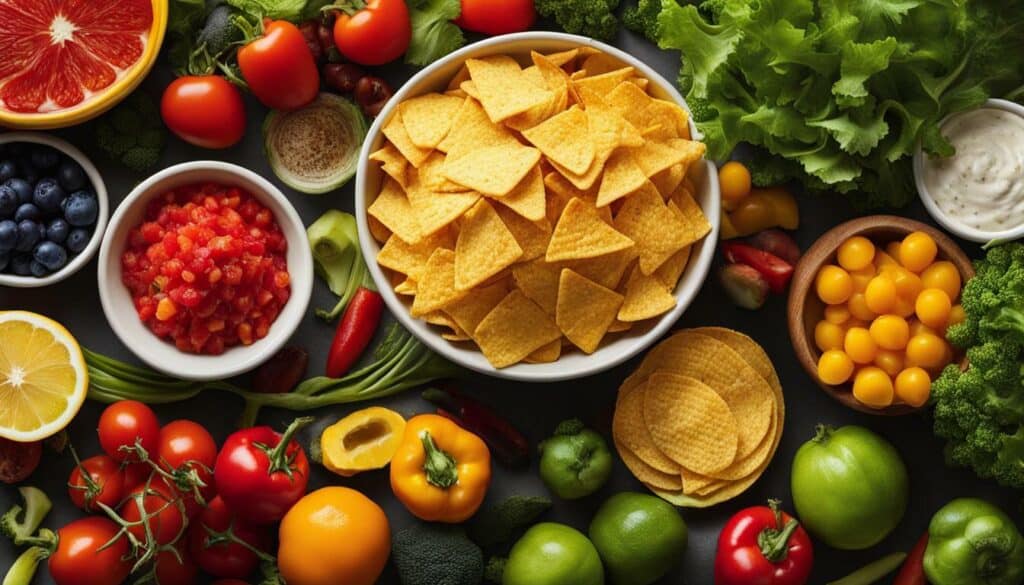
Understanding the appropriate serving size and practicing portion control can help you maintain a healthy balance when indulging in corn chips. It’s easy to get carried away and consume more than the recommended amount, but being mindful of your portions can make a significant difference in managing your carbohydrate intake.
According to the nutrition facts, a typical serving size of corn chips is around 1 ounce or about 28 grams. This equates to roughly 15 to 18 chips, depending on the brand and size of the chip. It’s important to note that the nutritional values provided on the packaging are usually based on this serving size.
When enjoying corn chips, try to pay attention to how many chips you’re consuming. It can be helpful to count out a portion size and put the rest away to avoid mindless snacking. Additionally, pairing corn chips with a protein-rich dip or incorporating them into a balanced meal can help create a more satisfying and well-rounded eating experience.
| Portion Control Tips for Corn Chips: |
|---|
| Create a small bowl or plate of corn chips to limit portion size. |
| Pair corn chips with protein-rich dips, such as hummus or salsa with added beans. |
| Include a serving of vegetables or salad alongside corn chips to increase the nutritional value of your meal. |
| Avoid eating directly from the bag to prevent mindless snacking. |
| Take breaks between bites to savor the flavor and prevent overeating. |
By practicing portion control and mindful eating, you can still enjoy the delicious crunch of corn chips while maintaining a balanced diet. Remember, moderation is key, and incorporating nutritious foods alongside corn chips can help you achieve a more satisfying and nourishing snacking experience.
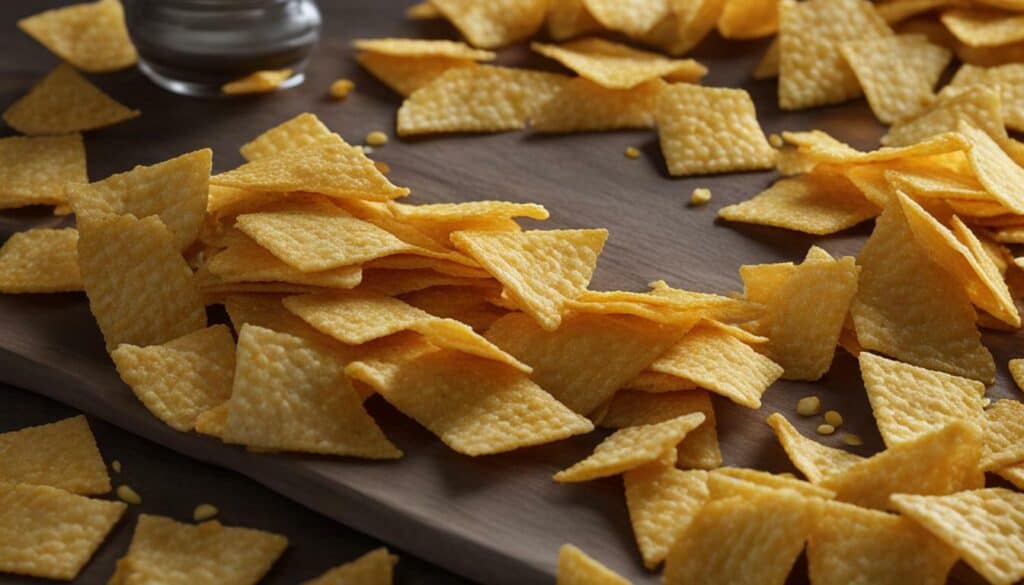
Are you curious about the similarities between corn chips and tortilla chips when it comes to their carbohydrate content? Let’s dive into the nutritional facts and unravel the truth. Both corn chips and tortilla chips are made from corn, which is a carbohydrate-rich grain. As a result, both snacks contain carbohydrates, but the specific carbohydrate content may vary depending on the brand and recipe.
According to a comprehensive breakdown of corn chips nutrition facts, one serving (approximately 28 grams) typically contains around 15 grams of total carbohydrates. However, it’s important to note that not all carbohydrates in corn chips are created equal. Some of these carbs are dietary fiber, which provides various health benefits, including aiding digestion and promoting a feeling of fullness.
Table 1: Nutritional Value of Corn Chips
| Component | Amount per Serving (28g) |
|---|---|
| Total Carbohydrates | 15g |
| Dietary Fiber | 1g |
| Protein | 2g |
| Fat | 10g |
| Calories | 150 |
Tortilla chips, being a type of corn chip, share similar nutritional characteristics. They are also made from corn and contain carbohydrates. Additionally, tortilla chips can provide essential minerals and healthy fats, making them a more nutrient-dense option compared to other snack choices. So, when reaching for a bag of tortilla chips, remember that you’re not only enjoying a tasty treat but also adding some valuable nutrients to your diet.
As with any snack, moderation is key. It’s important to be mindful of portion sizes and incorporate corn chips or tortilla chips as part of a balanced diet. By making informed choices and practicing portion control, you can satisfy your cravings while still maintaining a healthy lifestyle.
So, next time you’re enjoying a serving of corn chips or tortilla chips, remember that they can be a satisfying snack option when consumed in moderation. With their crunchy texture and savory flavor, these chips can add some excitement to your snacking routine without compromising your overall nutrition. Enjoy responsibly!

– Nutritionix. (n.d.). Corn Chips Nutrition Facts. Retrieved from [insert link here]
– USDA FoodData Central. (n.d.). Tortilla Chips, Nacho Cheese Flavored Nutrition Facts. Retrieved from [insert link here]
Conclusion
In conclusion, understanding the nutritional intricacies of corn chips allows you to make informed choices and enjoy them responsibly as part of your overall diet.
When it comes to corn chips, it’s important to be aware of the nutritional information. This knowledge empowers you to choose the right serving size and incorporate them sensibly into your eating plan.
While corn chips do contain carbohydrates, they can still be enjoyed in moderation. The key is to balance your intake with other nutrient-rich foods and be mindful of portion control.
Additionally, corn chips can offer some health benefits. They can be a fiber-rich snack, providing you with necessary dietary fiber. They also contain essential minerals and healthy fats, adding nutritional value beyond just carbohydrates.
By having a clear understanding of the nutritional facts, you can make informed decisions about your diet and still indulge in the occasional corn chip treat without feeling guilty.
FAQ
Q: Are corn chips high in carbohydrates?
A: Yes, corn chips are a carbohydrate-rich snack. They contain varying amounts of carbs depending on the brand and serving size.
Q: Are corn chips a good source of fiber?
A: Corn chips can be a source of fiber, but the amount can vary. Some brands offer fiber-rich options, while others may have lower fiber content.
Q: What minerals and healthy fats are found in corn chips?
A: Corn chips can provide essential minerals like calcium, iron, and potassium, as well as healthy fats, such as monounsaturated and polyunsaturated fats.
Q: Can I find low carb corn chips?
A: Yes, there are low carb corn chip options available in the market. These are specifically designed for individuals looking to reduce their carbohydrate intake.
Q: How do corn chips affect blood sugar levels?
A: Corn chips have a moderate glycemic index, which means they can affect blood sugar levels. It’s important to consider portion control and monitor your blood sugar if you have specific dietary requirements.
Q: How can I incorporate corn chips into a balanced diet?
A: Enjoying corn chips in moderation as part of a balanced diet is key. Pairing them with healthier options like salsa or guacamole and controlling portion sizes can help maintain a balanced eating plan.
Q: What is the recommended serving size for corn chips?
A: The recommended serving size for corn chips can vary, but typically it is around 1 ounce or 28 grams. It’s important to read the nutrition label and be mindful of portion control.
Q: What is the difference between corn chips and tortilla chips?
A: Corn chips and tortilla chips are both made from corn, but the main difference lies in their preparation and texture. Corn chips are usually thicker and have a more rigid texture, while tortilla chips are thinner and often have a lighter, crispier texture.
Are Corn Chips a Healthier Option Than Orange Chicken in Terms of Carbs?
When comparing the carbs in orange chicken analysis to corn chips, the latter can be considered a healthier option. Corn chips generally have fewer carbs than orange chicken, making them a better choice for those watching their carbohydrate intake. However, it’s important to consider other nutritional aspects as well before making a final decision.
Are Mayo Packets a High Source of Calories?
Are mayo packets a high source of calories? Uncovering mayo packet calorie truth reveals that while individual mayo packets can vary in their calorie content, they generally contain around 90 to 100 calories. It’s important to be mindful of using mayo packets in moderation if you’re watching your calorie intake.

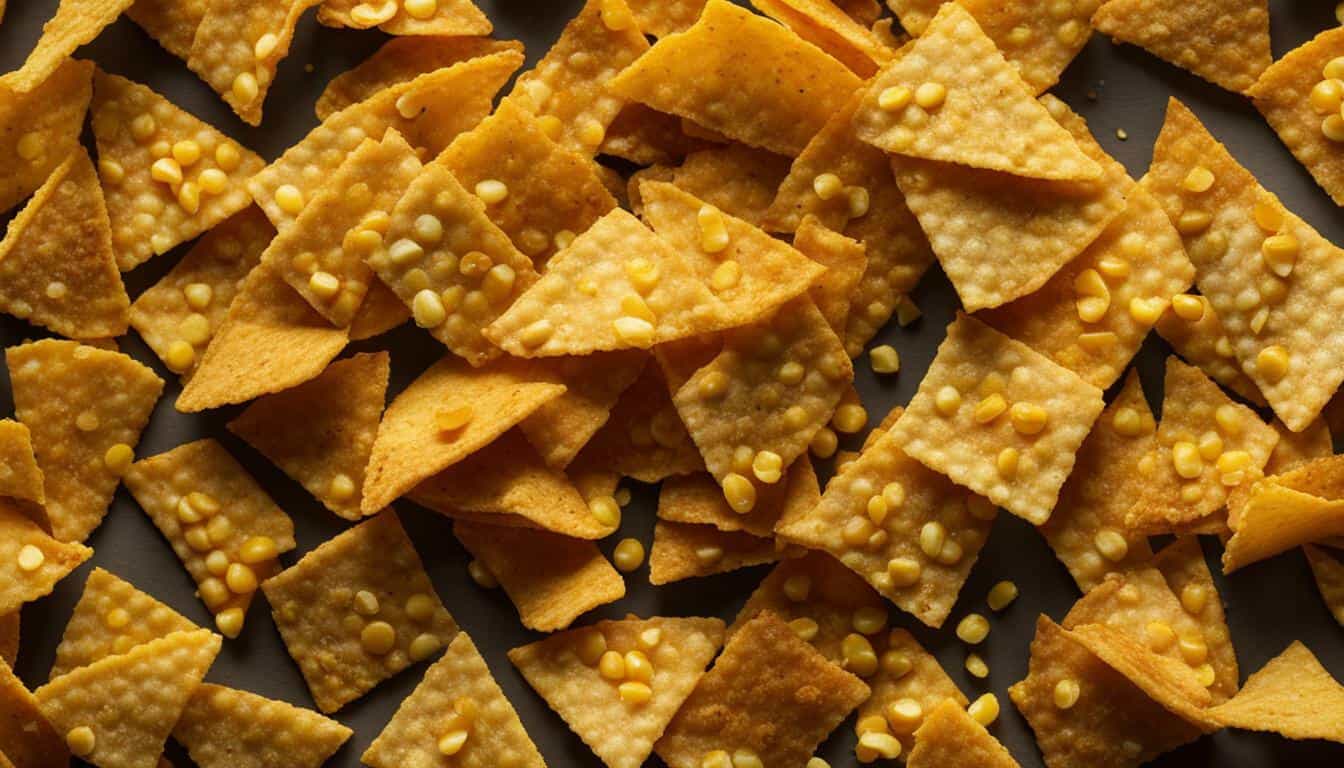

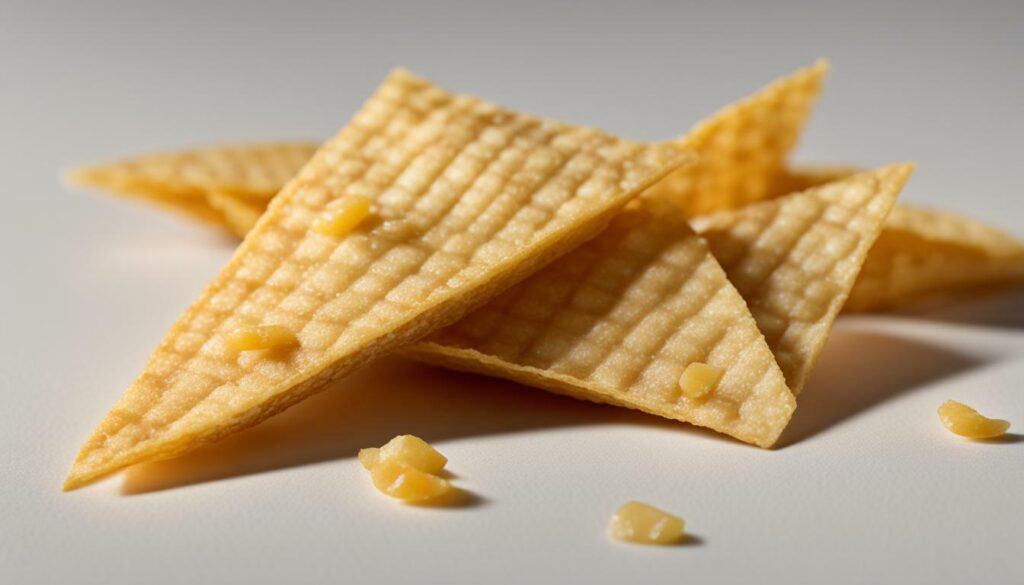



Leave a Reply